This article was co-authored by John A. Lundin, PsyD. John Lundin, Psy. D. is a clinical psychologist with 20 years experience treating mental health issues. Dr. Lundin specializes in treating anxiety and mood issues in people of all ages. He received his Doctorate in Clinical Psychology from the Wright Institute, and he practices in San Francisco and Oakland in California's Bay Area.
There are 11 references cited in this article, which can be found at the bottom of the page.
This article has been viewed 58,002 times.
If you know someone whose child has died, it’s hard to know what you can say or do to help them without making their pain worse. Before you do anything, it’s important to understand that bereaved parents never really “get over” their loss, and there’s nothing you can do to take away your friend’s heartbreak. However, your support and love will still mean a lot to your friend right now, and they’ll probably appreciate any practical help you can give them. Be there for your friend by reaching out to them, providing a listening ear, and lightening their day-to-day burden however you can.
Steps
Reaching Out
-
1Stay in touch. Let your friend know you care by giving them a call or sending a card after you get the news. Keep checking in with them regularly – texts, emails, and visits in person are all appropriate. Don’t avoid your friend or tiptoe around the subject of their child’s death, even if you’re nervous about saying something wrong.
- The worst thing you can do is disappear after your friend goes through a tragedy. Be there for them, even if you feel awkward about it.
-
2Spend time with your friend. Your friend might appreciate some company right now. Ask them if you can drop by, or invite them to get coffee or lunch with you. Even a fifteen-minute visit can help your friend feel less alone.[1]
- Ask your friend before you visit them. Don’t drop by unannounced.
- Frequent, short visits are often better than long ones.
Advertisement -
3Invite your friend to do things. Ask your friend if they want to go for a walk or see a movie with you. If you’re both part of any social groups or clubs, keep inviting them to get-togethers and catch them up on anything they’ve missed. Make them feel valued and included, even if they don’t want to socialize much right now.
-
4Be gentle, but persistent. If your friend turns down your invitations, don’t push the issue. Keep extending the invitations in the future, though. Your friend may not be ready to spend time around people yet, but they will still appreciate that you’re thinking of them.[2]
-
5Remember your friend’s child on anniversaries and holidays. Christmas, Thanksgiving, Mother’s Day, and Father’s Day are often tough for parents who have lost children. So are the child’s birthday and the anniversary of their death. On these occasions, let your friend know that you’re thinking of them and that you haven’t forgotten their child.[3]
- Send your friend a “thinking of you” card on their child’s birthday or the anniversary of their death, or just mention that you were thinking about their child.
- You can also comment on a memorial page the parents have set up online or on social media on these occasions.
- Don’t forget about second, third, and subsequent anniversaries. Anniversaries never stop being sad days for bereaved parents, but few others even remember them after the first year.
EXPERT TIPJohn Lundin, Psy. D. is a clinical psychologist with 20 years experience treating mental health issues. Dr. Lundin specializes in treating anxiety and mood issues in people of all ages. He received his Doctorate in Clinical Psychology from the Wright Institute, and he practices in San Francisco and Oakland in California's Bay Area.Clinical Psychologist
 John A. Lundin, PsyD
John A. Lundin, PsyD
Clinical PsychologistDon't expect your friend to forget these important days, no matter how long it's been. For your friend, this is a wound that will never fully heal, and they likely won't want it to, because it will be intimately attached to their memories and feelings about their child.
Finding Words of Support
-
1Take your friend’s grief seriously. Acknowledge and affirm your friend’s heartache. Don’t say anything that trivializes your friend’s pain, and don’t try to make them feel better – you can’t. It’s better to be sad with your friend right now than to try to cheer them up.[4]
- For instance, you could say something like, “This is really terrible. I’m so sorry that you’re going through this.”
- Don’t ever say, “At least you’re young enough to have more kids,” or anything like that. Even if you mean well, you’re still minimizing your friend’s grief, and that will make them feel worse.
-
2Ask your friend if they want to talk about their child. Your friend may want to share stories and memories about their child with whoever will listen. They might also not be ready to talk about their child yet. Ask, and if your friend does want to talk, listen patiently for as long as they need you to.[5]
- For many bereaved parents, talking about their child and their own feelings is a necessary part of the healing process.
-
3Use the child’s name. When you talk to your friend, don’t shy away from bringing up their child’s name in conversation. Tiptoeing around their name won’t save your friend’s feelings, and it will make your conversations awkward. Using the child’s name will make your friend feel like their child mattered and will be remembered.[6]
- For example, instead of saying, "Would you like to talk about it?," say "Would you like to tell me about Randy?"
-
4Share memories of your friend’s child. If you knew your friend’s child, share some stories about them. Reminisce about their good qualities and any times you spent with them. Let your friend know that their child is, and will continue to be, fondly remembered.[7]
- For instance, you could say something like, “I’ll never forget how much Michael made us all laugh when our families went to the zoo together last year.”
-
5Avoid platitudes and religious talk. Trite comments like, “He’s in a better place now,” or, “It’s all part of God’s plan,” aren’t comforting or helpful to a grieving person. If your friend isn’t religious, comments about God or heaven may even be painful to hear right now. It can be tempting to fall back on clichés when you don’t know what to say, but don’t do it.[8]
- It’s better to stay quiet than to accidentally make your friend feel worse.
Offering Practical Help
-
1Ask if you can do specific things for your friend. Ask your friend if you can run errands, cook, or do laundry for them. Better yet, just do the work quietly and let your friend know afterwards.[9]
- For instance, say something like, “Would you like me to come over and help you around the house tonight?” or “I made some food for you to put in the freezer. When should I bring it over?”
- Don’t just tell your friend to let you know if they need anything. Many people don’t like to ask for help, even if they need it. Take the initiative yourself.
-
2Offer to inform other people. Your friend might be dreading having to explain over and over to other people that their child died, especially if the death was unexpected. Ask if they would prefer for you to break the news to teachers, doctors, coaches, and other people their family interacts with often.
- Do not tell anyone about your friend’s loss unless they give you permission. It should be your friend’s right to decide how and when to break the news.
-
3Help your friend remember their child. As time goes by, let your friend know you haven’t forgotten their child. Light a candle for them, bring their name up in conversation now and then, or make a donation in their name.
- Don’t worry that you might be bringing back painful memories for your friend. For most bereaved parents, it’s very comforting to know that someone else still remembers and cares about their child.
-
4Be aware of the 5 stages of grief. To better understand what your friend is going through, recognize that there are 5 stages of grief and loss. The first is denial and isolation, followed by anger, bargaining, depression, and acceptance. If your friend seems “stuck” in 1 of the phases, like depression, you’ll be able to understand where they are at in the grieving process.[10]
-
5Suggest they join a support group. Many community churches and mental health centers offer special support groups for parents who have lost children. You might research organizations like this in your friend's area and pass along the information to them. If you live nearby, you might even offer to join your friend at a meeting, if it will make them feel more comfortable.
- Ask religious and spiritual leaders in their community about such groups. You might also contact mental health counselors or therapists to see if they facilitate parent bereavement groups.
- You might also search for groups online like The Compassionate Friends.[11]
Expert Q&A
-
QuestionHow do you support a friend who has lost a child?
 John A. Lundin, PsyDJohn Lundin, Psy. D. is a clinical psychologist with 20 years experience treating mental health issues. Dr. Lundin specializes in treating anxiety and mood issues in people of all ages. He received his Doctorate in Clinical Psychology from the Wright Institute, and he practices in San Francisco and Oakland in California's Bay Area.
John A. Lundin, PsyDJohn Lundin, Psy. D. is a clinical psychologist with 20 years experience treating mental health issues. Dr. Lundin specializes in treating anxiety and mood issues in people of all ages. He received his Doctorate in Clinical Psychology from the Wright Institute, and he practices in San Francisco and Oakland in California's Bay Area.
Clinical Psychologist The best thing you can do to comfort a grieving parent is to just be with them in how they're feeling. Resist the pressure and temptation to fill the silence just to avoid your discomfort. Try to imagine how they feel. Then, if you feel moved to say something from that empathetic place, it's more likely to be helpful.
The best thing you can do to comfort a grieving parent is to just be with them in how they're feeling. Resist the pressure and temptation to fill the silence just to avoid your discomfort. Try to imagine how they feel. Then, if you feel moved to say something from that empathetic place, it's more likely to be helpful. -
QuestionHow do you comfort a grieving friend?
 John A. Lundin, PsyDJohn Lundin, Psy. D. is a clinical psychologist with 20 years experience treating mental health issues. Dr. Lundin specializes in treating anxiety and mood issues in people of all ages. He received his Doctorate in Clinical Psychology from the Wright Institute, and he practices in San Francisco and Oakland in California's Bay Area.
John A. Lundin, PsyDJohn Lundin, Psy. D. is a clinical psychologist with 20 years experience treating mental health issues. Dr. Lundin specializes in treating anxiety and mood issues in people of all ages. He received his Doctorate in Clinical Psychology from the Wright Institute, and he practices in San Francisco and Oakland in California's Bay Area.
Clinical Psychologist Don't say or imply that everything happens for a reason, as this can feel offensive. Also, do not try to fix your friend's problems or succumb to the pressure to try to make them feel better. This will only make them feel less safe to share with you how they're feeling.
Don't say or imply that everything happens for a reason, as this can feel offensive. Also, do not try to fix your friend's problems or succumb to the pressure to try to make them feel better. This will only make them feel less safe to share with you how they're feeling.
References
- ↑ http://www.aarp.org/home-family/friends-family/info-07-2013/death-of-child-grief-sympathy.html
- ↑ http://www.kveller.com/17-things-to-say-to-someone-whos-lost-a-child/
- ↑ http://www.huffingtonpost.com/dr-cara-barker/what-to-never-do-when-som_b_155330.html
- ↑ https://grief.com/10-best-worst-things-to-say-to-someone-in-grief/
- ↑ http://www.telegraph.co.uk/women/mother-tongue/11600707/Child-bereavement-What-to-do-if-a-friends-child-is-going-to-die.html
- ↑ http://www.huffingtonpost.com/suzanne-leigh/7-mistakes-people-make-when-a-friends-child-dies_b_4409115.html
- ↑ http://www.today.com/parents/child-loss-what-you-should-should-not-say-parents-t30596
- ↑ https://www.helpguide.org/articles/grief/helping-someone-who-is-grieving.htm
- ↑ http://health.usnews.com/health-news/health-wellness/articles/2013/08/07/7-ways-to-help-a-loved-one-grieve
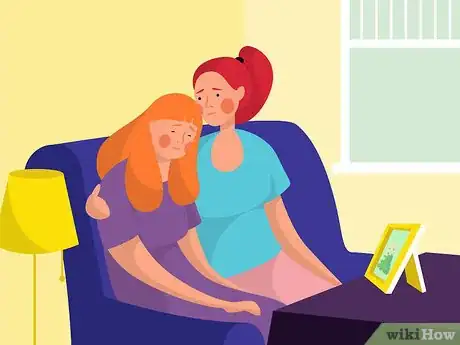




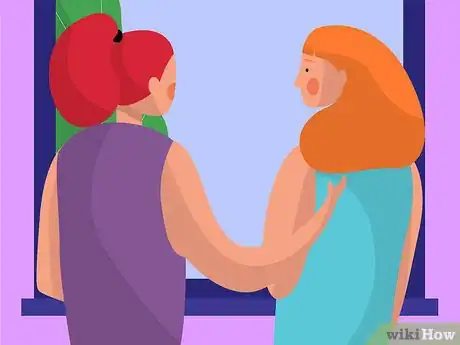


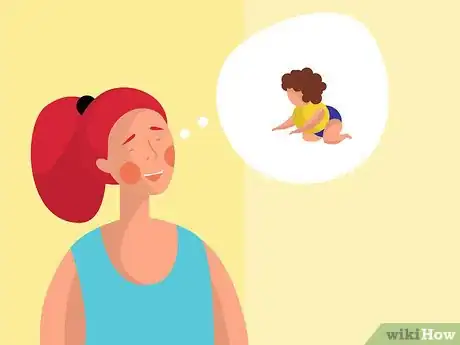


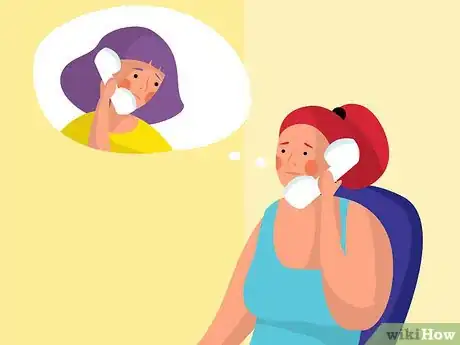

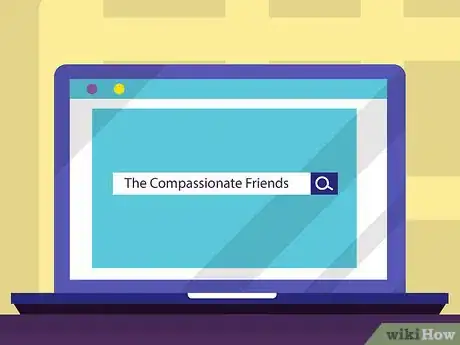
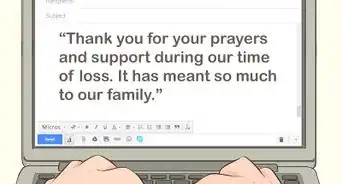


-Step-20-Version-2.webp)

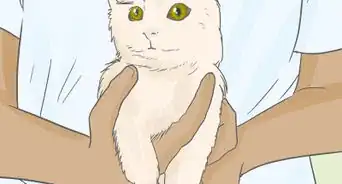

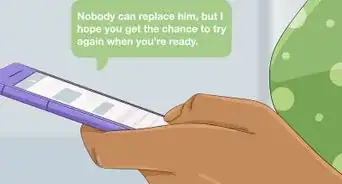



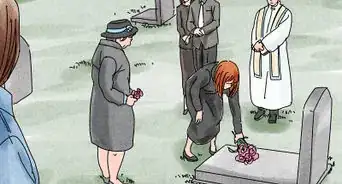









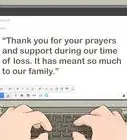


-Step-20-Version-2.webp)


































